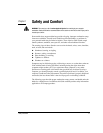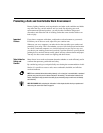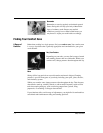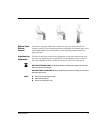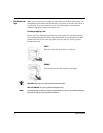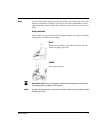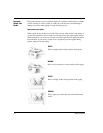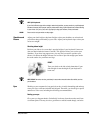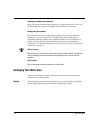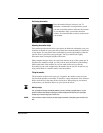
1-4 Safety and Comfort
Remember
Remember to exercise regularly and maintain general
fitness. Doing this will help your body withstand the
rigors of sedentary work. Respect any medical
conditions you may have or other health factors you
may know of. Adjust your work habits accordingly.
Finding Your Comfort Zone
A Range of
Positions
Rather than working in a single posture, find your comfort zone. Your comfort zone
is a range of positions that is generally appropriate and comfortable for your given
work situation.
Vary Your Posture
Depending on your tasks, you may find a range of seated
and standing postures that are comfortable. Within your
comfort zone, change postures often throughout the day.
Move
Sitting still for long periods can cause discomfort and muscle fatigue. Changing
postures is good for many parts of your body, including your spine, joints, muscles,
and circulatory system.
Within your comfort zone, change postures often throughout the day. Take frequent
short breaks: stand up, carefully stretch, or walk around. Frequently switch to brief
tasks that require getting up, such as retrieving output from a printer, filing
paperwork, or consulting a colleague down the hall.
If your furniture offers a wide range of adjustments, you might find it comfortable to
switch back and forth between sitting and standing positions.








